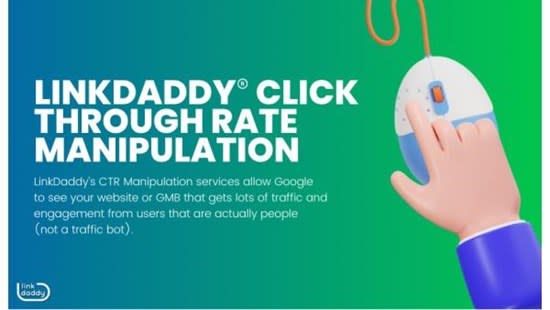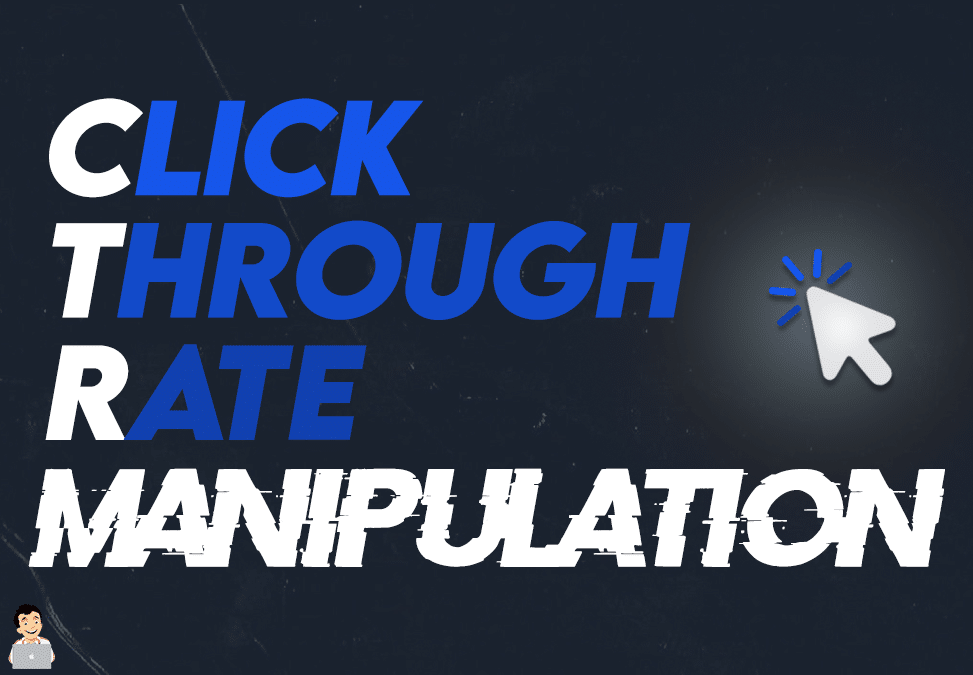LinkDaddy CTR Manipulation: Professional Solutions to Boost Your Click-Through Rates
LinkDaddy CTR Manipulation: Professional Solutions to Boost Your Click-Through Rates
Blog Article
Discovering the Connection In Between CTR Manipulation Providers and Individual Habits
In the world of digital marketing, the impact of click-through price (CTR) control services on individual behavior continues to be a complicated and intriguing subject. As online systems progressively depend on CTR metrics to gauge the success of material, products, and solutions, recognizing how these adjusted prices influence customer interaction and decision-making processes is vital. The interplay in between CTR adjustment and user behavior raises concerns about credibility, credibility, and the honest implications of such practices. By exploring the detailed relationship between CTR adjustment services and individual behavior, interesting insights emerge that might improve our understanding of electronic advertising and marketing methods and their impacts on customers.
Impact of CTR Adjustment on Habits
Assessing the influence of Click-Through Price (CTR) adjustment on user actions discloses essential understandings right into the dynamics of online involvement. CTR control entails artificially pumping up the variety of click a specific web link or promotion to deceive users and internet search engine. This technique can cause an altered perception of a website's appeal or significance, ultimately impacting individual habits.

Additionally, CTR adjustment can skew the data made use of by formulas to customize customer experiences. This can result in individuals being offered content that does not align with their choices or passions, ultimately bring about a decline in individual complete satisfaction and involvement. Comprehending the influence of CTR manipulation on individual actions is vital for keeping transparency and count on on-line interactions.
Customer Interaction With Manipulated CTR
Individual involvement with manipulated CTR information typically leads to manipulated perceptions of on-line material appeal and importance. When users engage with content based on artificially inflated Click-Through Rates (CTR), they may believe that certain information, products, or services are more popular or trustworthy than they actually are. This can result in users choosing based on misleading information, leading to potentially unfavorable outcomes.
Engagement metrics like likes, shares, remarks, and time invested in a page are frequently influenced by CTR manipulation. Users might be more likely to involve with material that appears to have higher involvement prices, additionally continuing the cycle of skewed perceptions. Therefore, web content designers and marketers may prioritize producing material that generates high CTR as opposed to concentrating on developing truly beneficial and pertinent product.

Emotional Impacts of CTR Control

In addition, the emotional results of CTR adjustment can additionally show up in modified decision-making procedures. Individuals might be much more inclined to click on content entirely based on its regarded appeal, instead than its actual value or relevance to their needs. This behavior change can lead to a shallow engagement with on-line material, where users might ignore top notch however less prominent offerings for those with artificially enhanced CTRs.
Basically, the mental ramifications of CTR manipulation highlight the importance of maintaining transparency and credibility in online communications to foster authentic user interaction and trust.
Moral Considerations in CTR Control
Considering the honest implications of controling click-through prices (CTR) in online systems is necessary for maintaining stability and trust fund within the digital ecological community. CTR manipulation increases problems about tricking customers, distorting data analytics, and endangering the trustworthiness of on-line content. One major honest factor to consider is the potential effect on user autonomy and decision-making. By synthetically blowing up CTR, customers might be deceived right into clicking on links or advertisements they would certainly not have actually chosen otherwise, bring about a more disingenuous online experience. CTR adjustment can alter the efficiency metrics that organizations count on to make critical choices, inevitably affecting market competition and consumer trust.
Another moral element to consider is the fairness of manipulating CTR to obtain an unreasonable benefit over competitors. Participating in such techniques not just breaks principles of reasonable play however likewise undermines the count on that customers place in online systems. It is essential for services and digital marketing experts to maintain ethical criteria in their methods to guarantee openness, reputation, and long-lasting sustainability in the online setting.
Ramifications for Digital Marketing
CTR adjustment can lead to skewed information analytics, misdirecting online marketers into thinking that their projects are doing far better than they in fact are. When customers understand that CTRs have actually been manipulated, it can erode trust in the brand, leading to long-term negative consequences for customer loyalty and brand name reputation.
Additionally, making use of CTR manipulation services can create an unfair competitive landscape, where business that participate in such methods get a fabricated benefit over those that stick to honest advertising standards. This can stifle development and imagination in digital marketing, as success ends up being even more concerning control strategies than delivering real worth to consumers. Ultimately, the implications of CTR adjustment for electronic advertising extend beyond temporary gains, affecting the overall sustainability and trustworthiness of marketing efforts in the electronic realm.
Conclusion
Finally, the connection between CTR manipulation solutions and individual behavior is complex and complex. The effect of CTR manipulation on habits, individual interaction with manipulated CTR, mental effects, ethical considerations, and implications for digital marketing all play a role fit this relationship. Recognizing these dynamics is important for marketers and YOURURL.com scientists alike in order to browse the moral implications and take full advantage of the effectiveness of their electronic marketing strategies.
Report this page